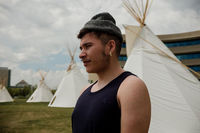"Intimacy Was a Lost Country" Billy-Ray Belcourt on His Origin Story & Reading Like His Life Depends on It
In 2017, Billy-Ray Belcourt took the poetry world by storm with his debut collection, This World is a Wound. It went on to win the 2018 Griffin Prize (amongst many other honours), making Belcourt the youngest winner in the prestigious award's history.
Now, just two years later, he returns with NDN Coping Mechanisms: Notes from the Field (House of Anansi Press), a powerful, entertaining, incisive collection that firmly cements him as one of the most imaginative and creative writers in the country.
Bending genres boundaries, NDN Coping Mechanisms examines Indigenous and queer identities and experiences, including life on the reserve, sex, history, and more. Witty, tough, thoughtful, and open, it's a collection that is already being called "masterful" "ferocious" "brilliant" and "haunting".
We're thrilled to welcome Billy-Ray to Open Book today to participate in our Poets in Profile interview, where we ask poets to share not only about their new work but also about the experiences that led them to poetry as a form. He shares a powerful formative moment that serves as "as good an origin story as any", and names the book of poems he read as if his life depended on it and the popular television show that served as an unexpected source of inspiration.
Open Book:
Can you describe an experience that you believe contributed to your becoming a poet?
Billy-Ray Belcourt:
I was a super closeted teen. I had a best friend with whom I watched gay media; she never questioned my motives, she allowed me to exist in ambiguity. One night, we watched Brokeback Mountain, which was randomly showing on one of the channels on my mom’s satellite TV. When the film ended (devastatingly so), my friend went home and I went directly to my room to plunge into the bed. I remember my body filling up with anxiety and sadness and, most intensely, despair. My future still had no shape to it. Intimacy was a lost country; I was a non-citizen. If I was wracked by something like desire in that moment it was its positive absence. That experience of longing for something I was certain I’d never attain was enormous. To me, that is also something of a definition of the poetic drive. This seems as good an origin story as any.
OB:
What is the first poem you remember being affected by?
BRB:
I read Leanne Betasamosake Simpson’s Islands of Decolonial Love in a frenzy, with rapt attention. I read it as if my life depended on it. In some sense, it did! In the book of songs and stories, Leanne opens up space to write and theorize about intimacy and love and indigeneity that has a utopian pulse; I hadn’t seen anything like it.
OB:
What has been your most unlikely source of inspiration?
BRB:
A clip I came across from So You Think You Can Dance. It was a contemporary routine choreographed by Talia Favia. I was like "Oh, if my body could move like theirs I wouldn’t need poetry." They breached the limits of ordinary embodiment in a way that gave them access to an artfulness registered on the skin. It issued to me a challenge of sorts, to try to, as I say in "What to an NDN is the Intrinsic Goodness of Mankind," "write as though the sentence were a set of limbs to be puppeteered."
Your CanLit News
Subscribe to Open Book’s newsletter to get local book events, literary content, writing tips, and more in your inbox
OB:
Do you write poems individually and begin assembling collections from stand-alone pieces, or do you write with a view to putting together a collection from the beginning?
BRB:
The poems usually exist in a thematic orbit. With NDN Coping Mechanisms, I wrote the poems and prose pieces with my mind on the autoethnographic as a site of severance and constitution for Indigenous peoples. This inevitably led me to particular places of articulation and not others.
OB:
What was the last book of poetry you read that really knocked your socks off?
BRB:
This year I’ve been reading a bunch of Carl Phillips’s books. His compressed poems and unfurling sentences are always riveting and luminous!
____________________________________
Billy-Ray Belcourt (he/him) is a writer and academic from the Driftpile Cree Nation. His debut book of poems, This Wound is a World, won the 2018 Griffin Poetry Prize and the 2018 Robert Kroetsch City of Edmonton Book Prize, and was named the Most Significant Book of Poetry in English by an Emerging Indigenous Writer at the 2018 Indigenous Voices Award. It was also a finalist for the Governor General’s Literary Award, the Gerald Lampert Memorial Award, and the Raymond Souster Award. It was named by CBC Books as one of the best Canadian poetry collections of the year. Billy-Ray is a Ph.D. student and a 2018 Pierre Elliott Trudeau Foundation Scholar in the Department of English and Film Studies at the University of Alberta. He is also a 2016 Rhodes Scholar and holds a Master’s degree in Women’s Studies from Wadham College at the University of Oxford.




